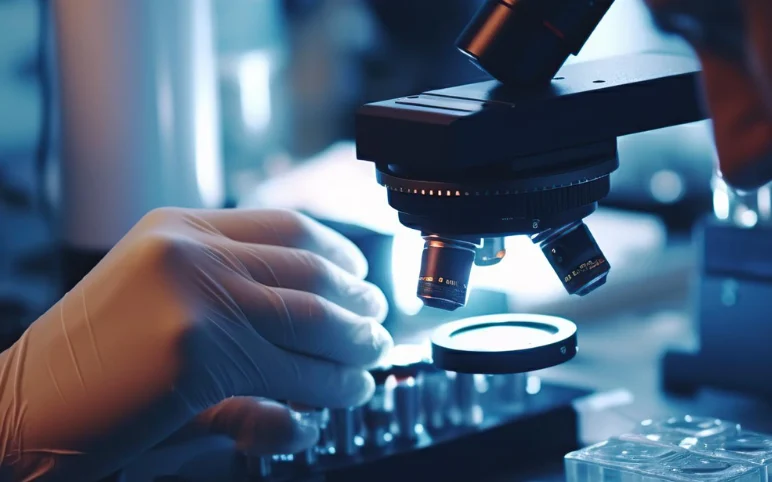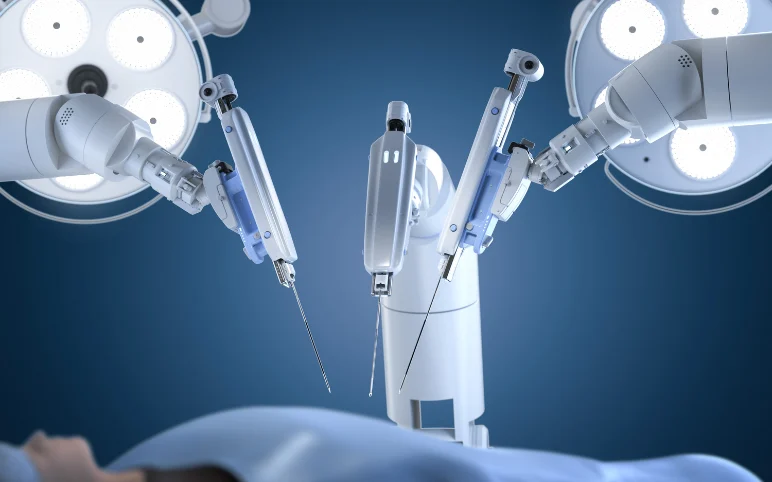Nexalin Technology Secures Israeli Regulatory Clearance for Gen-2 SYNC 15 mA DIFS™ Neurostimulation System; W&H Medical Launches First U.S.–Cleared Piezo & Drill Combo Console for Rhinoplasty & Facial Surgery; Elevaris Launches CDMO Services and Procedural Needle Offerings in EMEA; Cardinal Health Successfully Acquired Solaris Health; 4WEB Medical Sets a New Standard in Implant-Based Therapy; BD Reaches Key Milestone in AGILITY Trial Evaluating Revello™ Vascular Covered Stent for PAD
Nov 06, 2025
Table of Contents
Nexalin Technology Announced Regulatory Approval to Sell Gen 2 SYNC, 15 mA Neurostimulation DIFS™ Device in Israel
On October 30, 2025, Nexalin Technology, Inc., a company recognized for its Deep Intracranial Frequency Stimulation (DIFS™) technology, announced that its Gen-2 Console (“SYNC”) 15 mA neurostimulation device received regulatory approval for commercial sale in Israel from the Israeli Ministry of Health.
The company had been designing and developing neurostimulation systems to address the global rise in mental health conditions. Nexalin’s products were believed to be non-invasive, not perceptible to the patient, and intended to provide therapeutic relief for individuals affected by various mental health disorders. The company relied on bioelectronic medical technology, believing that its devices were capable of targeting deep mid-brain structures linked to mental health regulation. Nexalin also thought that the deeper-penetrating waveform in its next-generation devices could provide improved clinical outcomes without causing adverse side effects. Before this approval, the Gen-2 15 mA neurostimulation device had already been authorized for use in China, Brazil, and Oman.
Downloads
Click Here To Get the Article in PDF
Recent Articles
- How At-Home Medical Equipment is Improving the Quality of Medical Care?
- ONWARD Medical’s ARC-EX System Gains CE Mark; Microbot Medical Secures FDA 510(k) Clearance for L...
- Johnson & Johnson MedTech Secures CE Mark for Dual Energy THERMOCOOL SMARTTOUCH™ SF Catheter;...
- Motus GI’s Pure-Vu EVS System; EvoEndo’s Single-Use Unsedated TNE System; Orthofix’s OpusTM BA; I...
- Glowing Prospects: Energy-Based Aesthetic Devices Market Outlook
Mark White, CEO of Nexalin Technology, stated, “We are extremely proud to have received regulatory clearance in Israel, which is recognized worldwide for its rigorous and highly respected health regulatory standards. This approval is an important milestone that not only allows us to introduce our innovative, drug-free technology to patients and providers in Israel but also strengthens the global credibility of our platform as we pursue additional international markets. Globally, this builds on our prior approvals in China, Brazil and Oman. This recent approval in Israel directly supports our strategy to aggressively expand our presence across the region.”
“With this clearance in Israel, we are accelerating our discussions with regional distribution partners to launch commercial sales and deliver much-needed, non-invasive solutions for the treatment of mental health disorders,” added Mr. White.
As per DelveInsight’s “Neurostimulation Devices Market Report,” the global neurostimulation devices market size is expected to increase from USD 7,862.04 million in 2024 to USD 16,111.10 million by 2032, growing at a CAGR of 9.44% during the forecast period from 2025 to 2032. The market for neurostimulation devices is experiencing substantial growth, driven by a combination of factors. The rising global prevalence of chronic diseases such as chronic pain, neurological disorders like Parkinson’s disease, epilepsy, and essential tremor, and mental health conditions like treatment-resistant depression is a primary driver. This increased disease burden has created a greater demand for effective, long-term therapeutic options. Furthermore, significant technological advancements have made these devices more effective and user-friendly. Innovations such as smaller, rechargeable implants, “closed-loop” systems that respond to neural activity in real time, and the development of non-invasive options like Transcranial Magnetic Stimulation (TMS) are expanding their adoption.
Additionally, a more favorable regulatory environment and improved reimbursement policies are making these treatments more accessible to patients. This includes regulatory bodies approving a wider range of neurostimulators for new applications and insurers providing better coverage. Finally, the aging global population, which has a higher incidence of age-related neurological disorders and chronic pain, further contributes to the market’s strong growth trajectory.
W&H Medical Unveiled the Only FDA-Cleared Piezo & Drill Combo Console for Rhinoplasty and Facial Surgery
On November 05, 2025, W&H Medical announced the launch of its Piezo & Drill Combination Console, which became the only FDA-cleared device in the U.S. to integrate advanced piezo technology with a high-performance surgical motor. Designed for use in facial plastics, ENT, rhinoplasty, and craniomaxillofacial (CMF) procedures, the 2-in-1 modular system was positioned as a new standard for surgical precision, efficiency, and improved patient outcomes.
The device combined the Piezomed Pro and Amadeo surgical motor into a single modular platform, allowing surgeons to transition smoothly between ultrasonic and rotary tools during procedures. This integration supported a wide range of applications from delicate bone contouring in rhinoplasty to complex facial reconstruction while offering greater control and workflow efficiency. The piezo component enabled high-frequency, tissue-sparing bone cutting, protecting nerves and soft tissues, while the Amadeo motor delivered consistent torque and power where needed. Clinically, this resulted in reduced swelling and pain, quicker recovery times, and increased overall patient comfort and safety.
The system was also developed with operational efficiency in mind, featuring an ergonomic handpiece, wireless foot control, shared irrigation setup, and a durable tip changer for quick instrument adjustments. Additionally, W&H collaborated with leading facial plastic and ENT surgeons to create three specialized tip sets tailored to different surgical needs: a CMF Set for cranio-maxillofacial surgery, a Rhino Basic Set for open rhinoplasty, and a Rhino Advanced Set optimized for closed rhinoplasty.
“I would highly recommend this innovative and intuitive technological advancement for any rhinoplasty surgeon. The dual ability to use piezosurgery, as well as burs, is a real step forward in my practice. I have been using piezosurgery in my practice since 2013. This specific device is the most efficient piezoelectric handpiece I have ever used, with multiple tips that are strong and precise. I always wanted to have the ability to use burs, but the setup was very cumbersome,” says Dr. Aaron Kosins, Plastic, Reconstructive & Cosmetic Surgeon. “Now, with one foot pedal and one irrigation system, I can seamlessly switch back and forth between the different handpieces. My results have definitely improved, as well as the speed of the operation.”
“For me, the new surgical system from W&H MED is an all-in-one solution, as ultrasonic technology and burs are integrated in one device. I was involved in the development of the exclusive piezo tip set for dorsal preservation. With it, we have made the surgery even safer because subdorsal structures and radix can be treated more gently,” says Dr. Milos Kovacevic, Specialist in ENT Medicine and Facial Plastic Surgery.
As per DelveInsight’s “Cranio Maxillofacial Fixation Devices Market Report,” the global cranio maxillofacial fixation devices market is expected to increase from USD 2,037.95 million in 2024 to USD 3,825.73 million by 2032, growing at a CAGR of 8.26% during the forecast period from 2025 to 2032. The global cranio-maxillofacial (CMF) fixation devices market is witnessing strong growth due to the rising incidence of facial fractures, trauma cases, and congenital deformities requiring surgical intervention. Increasing adoption of advanced fixation systems in reconstructive and cosmetic surgeries is further fueling demand. Technological advancements, including 3D-printed implants, resorbable plates, and minimally invasive techniques, are enhancing surgical outcomes and driving market expansion. Growing awareness and availability of healthcare facilities in emerging economies are also contributing to growth. Additionally, the surge in road accidents, sports injuries, and a rising geriatric population susceptible to bone disorders are key drivers. The trend of medical tourism for cost-effective CMF procedures is expected to support further market growth globally.
Elevaris Introduced CDMO Services, Procedural Needle Portfolio to EMEA
On November 04, 2025, Elevaris Medical Devices, the contract development and manufacturing organization formed following the acquisition of UK-based XL Precision Technologies by U.S.-based Spectra Medical Devices, introduced its services and procedural needle portfolio to the EMEA region.
The company made its first appearance at COMPAMED, the international trade fair for medical technology suppliers held in Düsseldorf from November 17–20. As a CDMO, Elevaris provided extensive manufacturing expertise to support medical device companies in delivering high-precision solutions. Its production capabilities included precision micro-components, complex tubular components, and sub-assemblies, and it was recognized globally as a leading manufacturer of custom-designed procedural needles.
The company’s technological offerings spanned laser-based processing (cutting, welding, marking, sintering, and abrading), micro-machining such as EDM, micro-laser cutting, high-speed turning and milling, precision forming for micron-accurate component production, and metal finishing to enhance functionality and biocompatibility.
Elevaris also specialized in advanced needle manufacturing, including standard and custom grinding, injection and insert molding, and cleanroom assembly of delivery systems and instruments. Its EMEA needle portfolio, which included a broad selection of radiofrequency needles, was made available through distributors, kit packers, and private label partners in both CE-marked sterile and bulk non-sterile formats.
The company emphasized its collaborative approach and deep manufacturing expertise to deliver value-driven design, development, and production solutions. Its EMEA sales team operated out of Paris, with dedicated sales and manufacturing support for customers in the UK and Ireland.
“Elevaris Medical Devices brought together two long-trusted companies with highly complementary capabilities,” said Richard Zrebiec, CEO of Elevaris Medical Devices, “and we’re thrilled to introduce these offerings on Europe’s largest stage for medical device manufacturers.
According to DelveInsight’s “Contract Development Manufacturing Organization (CDMO) Market Report,” the global CDMO market size is projected to increase from USD 233.71 billion in 2024 to USD 407.09 billion by 2032, growing at a CAGR of 7.25% during the forecast period from 2024 to 2030. The Contract Development and Manufacturing Organization (CDMO) market is experiencing significant growth driven by the increasing prevalence of chronic disorders such as cancer, cardiovascular diseases, and diabetes, which has led to a surge in demand for innovative therapies. Alongside this, the rising need for biologics and small molecules, particularly due to their effectiveness in treating complex conditions, is expanding the scope of outsourced drug development and manufacturing. Furthermore, strategic activities such as mergers, acquisitions, partnerships, and capacity expansions among key market players are enhancing service capabilities and global reach. Collectively, these factors are expected to propel the growth of the CDMO market by increasing reliance on external expertise for efficient and scalable drug development solutions during the forecast period from 2025 to 2032.
Cardinal Health completed the acquisition of Solaris Health
On November 03, 2025, Cardinal Health announced that it had finalized the acquisition of Solaris Health, a leading urology management services organization in the United States. Through this acquisition, Solaris Health contributed a network of more than 750 providers across over 250 practice sites in 14 states, significantly expanding the Urology Alliance within Cardinal Health’s multi-specialty MSO platform, The Specialty Alliance.
According to DelveInsight’s “Urology Devices Market Report”, the global urology devices market is expected to increase from USD 34,898.97 million in 2024 to USD 63,320.19 million by 2032, growing at a CAGR of 7.77% during the forecast period from 2025 to 2032. The global urology devices market is increasing due to the rising prevalence of kidney stones, urinary incontinence, BPH, and prostate and bladder cancers, particularly among the aging population. Advancements in minimally invasive and robotic-assisted procedures, along with improved diagnostics, are boosting adoption. Additionally, increasing healthcare spending, expanding infrastructure in emerging economies, and rising lifestyle-related risk factors such as obesity and diabetes are further driving market demand.
4WEB Medical Ushers in the Era of Therapeutic Implant Technology
On November 3, 2025, 4WEB Medical, an orthopedic implant company specializing in implants based on its proprietary TRUSS Implant Technology, announced the results of a study conducted at the McKay Orthopaedic Research Laboratory, Center for Musculoskeletal Disorders, at the University of Pennsylvania.
The study, titled Therapeutic Implants: Mechanobiologic Enhancement of Osteogenic, Angiogenic, and Myogenic Responses in Human Mesenchymal Stem Cells on 3D-Printed Titanium Truss, was approved for peer-reviewed publication in Advanced Healthcare Materials (AHM), a journal recognized for showcasing high-impact medical material and device innovations.
The in vitro research, published in the October edition of the journal, highlighted a key finding that orthopedic implants designed with advanced structural architecture can stimulate a therapeutic biological response. TRUSS Implant Technology created a combined effect of hierarchical surface roughness and macro-level truss geometry. The study showed that implants incorporating strain through the truss elements produced a 30% increase in osteogenic activity in human mesenchymal stem cells compared to implants relying solely on surface roughness.
“We are extremely pleased with the results of this study.” said 4WEB’s founder and CEO, Jessee Hunt. “The evolution of our Truss Implant Technology continues to gain momentum. The UPENN study demonstrates that the truss implant maintains differentiation as the only therapeutic implant on the market. The structural mechanics of the truss design converts physiologic load into therapeutic strain at the surgical site, amplifying osteogenic activity. This therapeutic effect gives surgeons and their patients the best chance for success by providing ongoing support while biologic fusion takes place. Welcome to the era of therapeutic implants!”
According to DelveInsight’s “Orthopedic Implants Market Report,” the global orthopedic implants market is estimated to grow at a CAGR of 5.46% during the forecast period from 2024 to 2030. The orthopedic implants market is slated to witness prosperity owing to factors such as the increasing prevalence of orthopedic diseases such as arthritis, osteoporosis, and others, a growing burden of the geriatric population, the rising number of road accidents associated and other injuries, and the increasing focus on improving the safety, affordability, and usability of orthopedic implants for people are further expected to result in the appreciable revenue growth in the orthopedic implants market during the forecast period from 2024 to 2030.
BD Achieved Milestone in AGILITY Study of Revello™ Vascular Covered Stent for Treatment of Peripheral Artery Disease
On November 04, 2025, BD (Becton, Dickinson and Company), a global leader in medical technology, announced that it had completed enrollment of the iliac artery patient cohort in its pivotal AGILITY Investigational Device Exemption (IDE) study. The prospective, multi-center study was designed to evaluate the Revello™ Vascular Covered Stent in patients with peripheral arterial disease (PAD). The update was shared during a late-breaking clinical trial presentation at the VIVA (Vascular InterVentional Advances) 2025 conference by Dr. Sean Lyden, chairman of the Department of Vascular Surgery at the Cleveland Clinic and the global lead principal investigator for the AGILITY trial.
The AGILITY study represented BD’s continued efforts to advance self-expanding covered stent technology, targeting the need for greater flexibility, ease of delivery, and low-profile performance in treating complex PAD lesions. Conducted across as many as 45 investigational sites in the U.S., Europe, Australia, and New Zealand (NCT06111469), the study aimed to assess the safety and effectiveness of the Revello™ Vascular Covered Stent in treating de novo or restenotic lesions across two distinct patient cohorts: The common and external iliac artery cohort (n=118), which had now been fully enrolled, and the superficial femoral and proximal popliteal artery cohort (n=223), for which enrollment was still ongoing.
“Achieving full enrollment of the iliac cohort marks a critical milestone for the AGILITY study and for patients living with peripheral arterial disease,” said Dr. Lyden. “As our understanding of PAD deepens, the demand for innovative technologies that can expand our treatment options becomes increasingly critical.”
“This milestone reinforces the commitment of BD to advancing clinically meaningful innovation in endovascular care,” said JD Meler, MD, FSIR, vice president of BD Enterprise Pre-Clinical Strategy and Medical Innovation. “The Revello™ Vascular Covered Stent is our next generation system, designed to support physicians and help optimize outcomes for patients.”
According to DelveInsight’s “Peripheral Vascular Devices Market Report”, the global peripheral vascular devices market size is expected to increase from USD 9,853.30 million in 2024 to USD 15,544.32 million by 2032, growing at a CAGR of 5.92% during the forecast period from 2025 to 2032. The overall market for peripheral vascular devices is being strongly driven by the growing burden of Peripheral Artery Disease (PAD) and other vascular disorders, fueled by risk factors such as diabetes, hypertension, and obesity. Alongside this, the increasing preference for minimally invasive procedures is driving the adoption of advanced devices, such as stents, angioplasty balloons, and EVAR systems, due to their faster recovery times and reduced complications. Continuous technological advancements in product design, including drug-eluting technologies, bioresorbable materials, and imaging-guided delivery systems, are further enhancing treatment outcomes. Additionally, intensified product development activities and innovations by key market players are expanding the portfolio of practical solutions, collectively propelling the growth of the peripheral vascular devices market.
Downloads
Article in PDF
Recent Articles
- Masimo W1® Medical Watch Secured FDA 510(K) Clearance; Stereotaxis Received the CE Mark in Europe...
- How Is Digital Therapeutics Reshaping the Future of Healthcare?
- Pressure Relief Devices: Charting the Course of Market Evolution and Major Developments
- HR Pharmaceuticals Announced Collaboration with Poiesis Medical; Enovis Acquired Lima Corporate; ...
- NeuroLogica’s OmniTom Elite; Cordis’s S.M.A.R.T. RADIANZ Vascular Stent System; Rockley Photonics...




